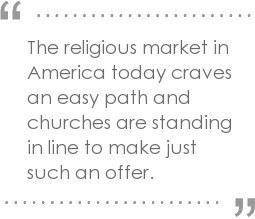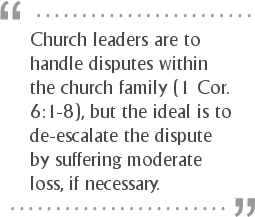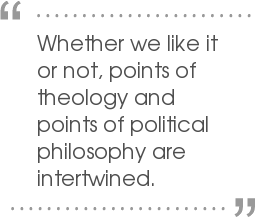Should We Suffer Fools Gladly?

Discussion
You Can't Quit! It's a Marathon!
 Appeared originally at SI on June 18, 2005 (archived version, with comments).
Appeared originally at SI on June 18, 2005 (archived version, with comments).
I admire the speed displayed by Asafa Powell. He’s 22 and runs like lightning. Possessing the fastest feet in the world for the 100 meters, he clocked an amazing 9.77 seconds in the Super Grand Prix in Athens. That’s fast.
Discussion
Shortcut Christianity

Discussion
Book Review - Washed and Waiting: Reflections on Christian Faithfulness and Homosexuality
[amazon 0310330033 thumbnail]
Homosexuality. The word stirs many reactions today. Many Christians who don’t know homosexuals personally remain puzzled and scared by this term. Many suspect the word does not picture a reality, only an intentional perversion of God’s created order. Pat answers are easy, and when it comes to homosexuality a simple Bible-based condemnation seems all that is in order. It is easier and more convenient for us to file the word, and whatever reality it represents, away into a tidy corner—far away from our experience.
Discussion
Defeating Boredom
 The boredom problem
The boredom problem
American Christians and Americans in general are suffering from a plague of boredom. This boredom epidemic is a factor in our moral, social, and spiritual downturn. It contributes toward wasted lives, fractured families, and what seems to me to be a rise in depressed persons. We live in a nation where people work, do what they are constrained to do, and then view DVD after DVD or spend hours with video games.
Discussion
Parable on Sanctification

The army of an evil duke storms the castle gates of an ancient kingdom. With murderous zeal the raiders pillage and torch the city. Amidst the mayhem, the infant son of the kind and noble king is captured and transported to the duke’s castle where the boy is enslaved to the sadistic warden of the dungeon.
From his earliest memories the captive prince is abused. As time passes he knows only the life of a tortured slave whose days are spent toiling in the dank confines of the dungeon. He is denied proper food, shelter and clothing. He is never permitted to bathe. He sleeps on a thin pile of vermin-infested straw, his ankle shackled to a post.
The prisoners he attends verbally abuse him. The warden routinely flogs him and with sadistic glee poisons the boy’s mind to believe that all his troubles are directly traceable to the dominion of the king. Under these horrific conditions the prince’s soul shrivels and becomes a dark haunt breeding many vices.
Early one winter morning, the boy is startled awake by shouts of panic. The king has mounted a successful attack against the traitorous duke’s castle. After the duke’s army is subdued, all the boys of a certain age-range are lined up against a castle wall. The prince, with no idea who he really is, stands in the frigid air shaking, virtually naked, and filled with loathing for the conquering king. The boy is covered from head to toe in grime. His long hair is matted and snarled. His nails are grotesquely long, his lips cracked, his feet bleeding. He nurses infected wounds. He is emaciated and unspeakably repulsive.
Working his way down the line of boys, an armored knight eventually arrives at the prince. The knight grabs the boy’s grimy wrist and carefully inspects his forearm where is revealed a distinctive birth mark. With thunderous voice, the knight turns and announces: “Here he is, your Highness!” To the boy’s utter astonishment, the king’s soldiers immediately drop to one knee, bowing their heads toward him in homage. The regal king who watches the proceedings intently from atop his steed dismounts and swiftly approaches. The boy cowers against the wall, instinctively bracing for the worst. But to his further bewilderment, the king he so despises does not raise his hand to strike, but stands before him with open arms. Tears fill the strong man’s searching eyes. A look of tender compassion graces his rugged face such as the boy has never witnessed. Suddenly, the king embraces the boy and with a strong hand pulls the prince’s head to his chest and speaks lovingly into his ear: “I have at last found you, my dear lost son. Welcome home.”
Discussion
The Pursuit of Joy
 The author of this essay is no longer involved at SI, but it’s too good to let gather digital dust. First appeared at SharperIron on May 2, 2005. The original post and discussion are available here.
The author of this essay is no longer involved at SI, but it’s too good to let gather digital dust. First appeared at SharperIron on May 2, 2005. The original post and discussion are available here.
Discussion
On Being Generous with Grace

Discussion
Apolitical Faith? Objections to Christian Political Engagement, Part 1
 Meet the apolitical right
Meet the apolitical right
“I’m apolitical,” a pastor friend told me not long ago. His tone and body language communicated disdain for the whole business of candidates, legislation and public policy. The response I did not verbalize was, “Great. Another one.”
This apolitical attitude seems to be on the rise among theologically serious (especially gospel-serious) evangelicals and fundamentalists. An underlying conviction seems to be that the Bible and Christian living have nothing at all to do with any political agenda. Ministry and true discipleship are only hindered by attention to political matters. To the most passionate apoliticals, the correct course is not a matter of balance (moderation in political engagement) or discipline (proper limits on the kind of political engagement). It’s a matter of purity: faith and ministry should not mix themselves in any way with the poison of politics.1
In practice, this means churches should avoid taking positions on matters perceived to be “political issues,” and pastors and teachers should refrain from teaching and preaching on political topics. Above all, believers should not express their political views in any way that might alienate someone with whom they hope to have a gospel witness. Having a mild interest in politics and casting a vote on election day is okay, but going beyond that is heading down the wrong road.
A variety of factors motivate the apoliticals I’ve interacted with. Some simply have temperaments that are deeply averse to the conflict and strife of politics. Others have absorbed some of the thinking of the evangelical left (such as the “Red Letter Christian” fondness for pitting the supposed teaching of Jesus against the rest of Scripture rather than interpreting Jesus in light of the rest of Scripture).2 In almost every case, constituents of the apolitical right see the Moral Majority efforts of the 1980s as a travesty and decry anything today that seems similar.
Whatever the primary motivation, apoliticals offer specific objections to all but the most mild and private forms of political engagement.

Discussion